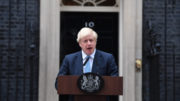I make no secret of the fact that I vehemently dislike Islam as an ideology. Just a basic look at the sort of societies and cultures that Islam creates should tell anybody with an IQ greater than a kumquat that Islam is a bad ideology, at least in its majority forms of Shia and Sunni. Let’s be frank here, it’s not poverty or geography that has turned Pakistan into a monstrous oppressive shithole nor is it entirely the legacy of colonialism that created failed states like Somalia or horrific violent terrorist movements in places like Mozambique and Nigeria. To a greater or lesser degree these named countries have had problems that have stressed them economically and socially but in all of them Islam and the cultures and societies that it builds have made these problems worse and even in some cases turned these nations into basket cases.
We can get some idea of how much Islam has made bad situations in countries worse by looking at other nations that have suffered enormous social and political trauma but which have not declined to anything like the extent that Islamic nations and Islamic cultures have declined. Look at South Korea or Vietnam or Germany or Poland or the former Yugoslavian states for comparable situations where Islam has not, at least not to any large extent been involved.
Both South Korea and Vietnam suffered the effects of appalling and destructive proxy wars during the Cold War period between East and West yet today South Korea is an economic powerhouse and Vietnam is slowly transforming, although sluggishly, into a market economy and moving away from Marxist style Communism.
Germany in the 20th century had, after WWI, a collective brain fit that led to the mass murdering Nazi period and a half a century of division between a Soviet led side and a Western aligned side. Germany is now the richest country in Europe. Poland and the Poles were treated with contempt and oppression by both the Germans and the Russians over the course of centuries and lived under Communist dictatorship for 50 years. Now Poland is a self confident independent nation that looks after its own people and is proud to do so. The various states that made up the former Yugoslavia, despite suffering a devastating civil war and incidents of genocide are now fully functioning market driven states. None of these states, are or were Muslim, at least not to any significant degree although Yugoslavia and its successor states have a Muslim minority that is from what I can gather broadly secular.
The reason for this lengthy preamble and introduction before I get to the ‘From Elsewhere ‘ piece that I want to feature and comment on is that the stark difference between nations that are run by Islam those that are not. They show that Islam needs reform. It needs reform so that it can divest itself of things like a violent hatred towards women, the cultural acceptance of paedophilia that Islam has in some places, the supremacism and its intolerance and small mindedness. A reformed Islam would give the citizens and subjects of those countries where Islam holds sway a much better, more free life and a life with more opportunities. The problem is the prospects for reform in the Islamic world are not great and also in the non-Muslim world there are groups and currents that get in the way of such reform.
On the Areo platform there is a fascinating article by Israa Thiab about how an obsession with ‘Islamophobia’ inhibits reform and also shields extremists from criticism.
Isaraa Thiab said:
Islam can and should be reformed. We should not conflate legitimate criticism of Islamist ideology with anti-Muslim bigotry. It is the duty of those who seek progress for humankind to speak out against the bad faith actors trying to shut down long overdue conversations about reform.
There’s little to disagree with there. Legitimate criticism or even mockery of Islam and Islamic public personages is not the same as punching a Muslim in the face because they are Muslim. Yet continually in the West and in particular in the UK, we see a legitimate dislike of Islam the ideology conflated with punching someone in the face merely because they are Muslim.
Israa Thiab then went onto describe her own upbringing in a Muslim family that encouraged questioning and her late father’s attempt to promote the idea of Islamic reform whilst living in states that had Islam as part of their governing structure. This part of her article makes for depressing reading as it tells of an attempt at reform, a much needed and necessary reform, that was carried out under the oppressive and repressive eye of the state.
Ms Thiab then goes on to say this:
My experience with Islam has been peculiar, yet it has shown me that a reason-based reform of Islam could actually happen. But because I face relentless social resistance and the possible risk of legal persecution in my home country, I look to the liberal West as a safe space where I can voice my criticisms and share my aspirations without catching the attention of the wrong people. Unfortunately, that safe space has been compromised by the authoritarianism of identity politics.
Spot on there. The West should be a safe place for those who wish to see reform of Islam and see Islam subjected to reason. Unfortunately this is not the case. We have a plethora of Islamic organisations, some funded by the British state, that have inhibited discussion about Islam because they are so obsessed with ‘Islamophobia’. Such is the depth of this ‘Islamophobia’ obsession that these groups, their activists and their supporters, have become embedded into government, police forces and in social media companies and they have encouraged both suppression of discussion about Islam and the oppression of those who do speak up and who criticise Islam. Ms Thiab is correct when she says that identity politics has become authoritarian and that authoritarianism has compromised what should have been a safe space to discuss and promote Islamic reform.
Ms Thiab proceeds to discuss recent matters where ‘Islamophobia’ has been unjustly trumpeted such as the appearance of the new head of the Muslim Council of Britain on BBC Woman’s Hour and Ayaan Hirsi Ali’s new book and the criticisms of it. These matters whilst both interesting and also related to the issue of ‘Islamophobia’ accusations inhibiting discussion are probably best read I the context of Ms Thiab’s article rather than excerpted here. You can find the entirety of the article via the link below:
https://areomagazine.com/2021/02/22/how-accusations-of-islamophobia-hinder-muslim-reform/
However, what is very pertinent to her accusation that obsession with ‘Islamophobia’ gets in the way of Islamic reform and shields Islamic extremists is this:
The constant accusations of Islamophobia in response to valid critiques of Islamist ideologies are depressing. Identity politics discourse tries to silence such critiques by tapping into the politically correct zeitgeist that discourages good faith analyses of Islamic belief systems and traditions. Sadly, those who advocate this approach are oblivious to the damage they are inflicting on the very same marginalized Muslim communities they claim to want to protect.
There is a dire need for good faith examinations of Islam and Islamic belief systems. In part this is because the negative aspects of these belief system adversely affect those in Islamic communities and as I’ve said in the past, contribute to a situation where the first victims of Islamic violence and intolerance and oppression are Muslims themselves. The other reason for there being a need for such examinations of Islam and its beliefs is that there is now a significant minority of Muslims living in previously non-Muslim countries. Those who are citizens of these countries should be able to examine Islam to see whether or not this ideology poses a threat to them and their societies. If it does pose a threat then something needs to be done about that threat and one way to reduce that threat may well be to encourage Islamic reform.
Ms Thiab continued:
Islamophobia is neither real nor dangerous. It’s a term exploited by authoritarian actors to smear their political opponents, rally the masses and consolidate power for themselves. Crying Islamophobia shields radical Islam from much needed scrutiny and demands for progressive change.
Anti-Muslim bigotry is real and dangerous. But accusations of Islamophobia actively feed into anti-Muslim sentiments by preventing genuine debate, maintaining a status quo of radicalism and oppression within Muslim communities and reinforcing cultural rifts.
Again there is very little to disagree with in these two paragraphs. There is a danger in harming Muslims merely because they are Muslims. It’s not just wrong but also incredibly stupid as there is no way or any such assailant to know whether they are harming someone who is an extremist nutjob who fantasises about jihad or whether the victim is a member of a very progressive Ismaili or reformist Islamic group. This sort of behaviour also does indeed encourage a culture of oppression or perceived oppression in Islamic communities and making radicalisation worse.
Ms Thiab is also again correct in her assessment of ‘Islamophobia’ as neither real nor dangerous. It’s a made up word for a made up phobia. It is also all too easily for groups with an interest in shielding Islam from criticism whether these groups be ones with known connections to extremism or whether they be identity politics grievance mongers. Islam needs scrutiny just as any other religious, philosophical or political belief should be scrutinised.






I genuinely admire Muslims like Ms Thiab, and I also agree with much of what she says, but (and as her full article implies in the experience of her Father) history is against any “reason based reform” of Islam.
The problem is not just with ” Islamist ideologies, such as those of the Muslim Brotherhood, Salafism and Wahhabism”. There is nothing controversial (Islamically speaking) with their ideologies; in fact such ideology lies entirely within the mainstream of Islam going right back to mohammed and his companion murderous thugs.
Let me state at this point that Al-Azhar has never been prepared to condemn ISIL as “un-Islamic”, but it has so condemned “reformist” Muslims, thus it isn’t a dislike of being labelled “Takfiri” that has prevented Al-Azhar doing so, it is that Al-Azhar considers ISIL at least “Muslim enough” to avoid strong censure.
The problem is that a reform of Islam itself such as that proposed by Ms. Thaib runs counter to the “triple lock” that Islam has against reform:
Lock one : if it’s in the Quran, and not abrogated, that’s the way things have to be forever. (This is based on the premise that the Koran is the literal word of “Allah”.)
Lock two: if it’s become part of Sharia, whether or not it’s in the Quran, it must stand forever. (The best example of this is the case of the “verse of Rajam” -Stoning of adulteresses – which has been lost from the Koran but is found in the Ahadith and which actually abrogates a Koran verse.)
Lock three: If anyone disagrees with lock 1 or 2 they are (at best) a “Munifiq” (hypocrite) or (at worst) an apostate who can be killed out of hand.
This is not to say that there are not multiple ways of interpreting Islam, but to create a peaceful Islam you either need your own prophet (a la Ahmadhis who are persecuted by both Sunni and Shia for it) or “interpreter” (a la Isma’ilis) and/or take a gnostic pathway as do some Sufi orders, but either way you must ignore the majority of the teaching and history of Islam.
This means that the “mainstream rationalist” (if you will pardon the oxymoron) is easily countered by orthodox Muslims pointing out how the rationalist ignores (as the rationalist must) swathes of the teaching of Islam as found in the Koran and Sunnah and the orthodox Muslim has by far the greater weight of Islamic teaching, history and experience on his side of the argument than does the rationalist, thus the orthodox Muslim’s argument is by far the most convincing to “al-muminoon” – the faithful of Islam, or at least those that are call themselves believers.
It is this that makes “radicalisation” or, more accurately, “orthodoxisation” so attractive and powerful. The orthodox Muslim knows without doubt that s/he is following Islam “fi sabeeli allahi” – “in the way of Allah” (and Mohammed) because such beliefs and attitudes are most consistent with what Islam says about itself in its sources.
From the Mutazalites to Kamal Ataturk, attempts at reform of Islam have invariably failed in time (as we see at present with the re-Islamification of ‘modern’ Turkey and its growing neo-Ottoman aims) and thus whilst Ms. Thaib and others like her have a noble idea I fear (and I mean that literally) that it is doomed to failure like all such attempts before it. It is actually frightening to see how Islam locks its evil within its teachings and how this prevents its re-interpretation within the mainstream of Islam.
IMO the only way to “reform” Islam is for Muslims to abandon Islam. They may believe in a sort of “Islam-lite” or become “cultural” or “secular” or “agnostic” Muslims (I’ve actually met a hijab wearing Muslima in the UK who stated she was agnostic!), but however you slice it, according to Islam itself that makes them (more or less) non-Muslims, no matter what the modern fashion for self-identification may be.
Many peaceful Muslims (IMO) are actually in this position. They have rationalised away the parts of Islam’s teaching that conflict with their innate humanity (the irony is that Islam also stresses kindness, generosity and charity to Muslims and if that view is strong then the attitude spills over onto non-Muslims as well thus creating the dissonance between different parts of the teachings of Islam) or, in the attempt to harmonise them, decide that (e.g.) sword-jihad is not required because …
It is also worthwhile bearing in mind the recent experience of Christians (who are a “tolerated” minority in Islam) in Iraq and Syria. In many cases when ISIL came calling their neighbours who had been friends (sometimes for “centuries” according to reports) turned on them and very actively and enthusiastically aided ISIL in the despoilation, murder and expulsion of their Christian neighbours.
“Quietist” Salafists (particularly in the West) are often peaceful because they think the conditions for sword-Jihad (adequate Muslim military strength to ensure gains) are not yet in place where they are living and the tension between the “Quietist” and “Jihadist” branches of Salafism are well documented.
I take from this that there are many “peaceful” Muslims who use the peaceful teachings of Islam as a “place-holder” until the suitable circumstances for sword-Jihad against the infidel arise.
There is a lot more that could be said to build the full argument, but I did not intend to write an essay, so I’ll finish with this:
Individual Muslims may believe and act on as much or as little of Islam as they wish for a multitude of reasons, but Islam in and of itself is un-reformable.
Thank you for your truly excellent and erudite comment. Would you mind very much if I highlighted it as a full post? I absolutely agree with what you say about how individual Muslims can believe as much or as little about Islam as they want and also about the obstacles to reform of the ideology itself. You are also correct with your description of radicalisation as Orthodoxisation as radicalism is a more strong cleaving to Islamic orthodoxies.
There is without a doubt bad stuff in Islam and it is groups like Ahmediayya who have tried to create a different form of Islam a form without much of the bad stuff but as you say they have been persecuted. As an aside, one of the problems that we have in the West is that many of the communal organisations are not led by reformers or Ahmediyya or the Ismails whose attitudes to women are streets ahead of some other Islamic groups. It does not help that forms of Islam that are uncompromising are influential in organisations like the Muslim Council of Britain.
I am perfectly happy for you to highlight it as a full post, but the argument is incomplete. In particular it lacks mention of Taysir – the doctrine of ease – and I’d like to add that (initially as another comment here) to it before you do if that it okay with you.
Now, I largely agree with you about the problem of the West viz-a-viz the leaders of the communal organisations not being rationalist Muslims, but on the other hand the sad fact is that outside the west at least it is the attitudes of the Muslim Brotherhood that are mainstream orthodoxy, they are “central” within Islam (as ICAW puts it), not extremist.
Great. Thank you. Will await that comment with eagerness. I’ll stitch the comments together for an article.
Yes that issue with the MB is correct. I was reading a piece by Bernard Lewis that was written in the mid 70’s entitled The Return of Islam and even back then he was pointing out the power and influence of the MB. The MB are influential in the UK’s MCB.
https://www.commentarymagazine.com/articles/bernard-lewis/the-return-of-islam/
Guest post now up at: https://www.fahrenheit211.net/2021/02/26/guest-post-is-reform-of-islam-possible/
Comment part 2
Another reason for the peaceable nature of most orthodox Muslims in the west is the doctrine of Taysir or “ease”.
What this says is that Muslims may set aside parts of Sharia (which includes a duty of Jihad under certain circumstances) when their implementation would cause them problems.
Thus orthodox Muslims in the west may set aside stoning, amputations, killing apostates etc. if they believe (and rightly) that enacting such things would bring trouble – in these cases criminal prosecutions – on their heads.
Thus they might say “We don’t think it is right to amputate/stone/etc.” and they would not be lying, because in their present situation it isn’t “right”, it has been set aside to avoid “persecution / oppression” of the Muslims for implementing sharia law.
But note that these elements are set aside – they are not abandoned, abrogated, or removed from the Islamic canon. They are merely in abeyance until such time as they can be implemented.
This is why some commentators refer to “creeping Sharia”. It is the gradual re-establishment of Sharia as time, opportunity and circumstance permit, initially within the Muslim community but eventually (if unchecked) this will inevitably lead to the imposition of sharia on the non-Muslim population.
So orthodox Muslims ask nicely to be permitted religious dress at work … then for washing facilities to be built … then for time off for prayer … then for their own parallel legal system (i.e. “Sharia Courts”) …
A second example is the attempt by various Muslim groups to use “Hate-speech” laws to silence any critique of Islam (such as this) as a case of “hate speech” and “Islamophobia” (thus utilising “Jihad of the tongue/pen”), an argument they seem to be winning at present.
Again, the “no-go zones” in various continental Countries show that eventually orthodox Muslim enclaves form where the “Authorities”, including emergency services, fear to tread and in which the law of the land no longer holds sway but is replaced with restrictive Sharia norms and which may well be “policed” by self-styled Mutaween “religious police”.
Thus the Sharia elements set aside under the doctrine of Taysir are gradually restored and implemented and the Islamification of the west continues, perhaps slowly, but definitely steadily.
For many orthodox Muslims the success of the forms of Jihad I have described in the paragraph above – known as “hand and tongue/pen Jihad” – is enough of a, or at least another, reason to hold off on sword-jihad.
Why risk the crushing of Islam in the West by a majority population enraged beyond all restraint by sword-Jihad when the more peaceful forms of Jihad are working so well?
Sword-jihad will always cause loss and damage to the Muslim community, the killing wouldn’t be entirely one-sided if Muslims raised an insurrection, so why take the risk when it may not be needed in order to bring the west within the fold of Islam?
Footnote: The final step, for orthodox Muslims, is the reduction of the non-Muslim population to at least de facto Dhimmi status and preferably de jure Dhimitude; as, for example, offered by Al-Baghdadi to the Christians of Raqqa. As to what that means, I recommend reading the Pact of Umar, and perhaps I might recommend this source as a start: http://www.faithfreedom.org/the-pact-of-umar/
——————————————————————————————————————————————-
That’s it F211.
Thank you. Am stitching this together now.